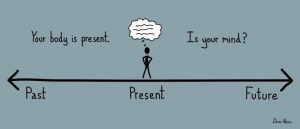Hilary Ilick works as an executive coach, a life coach, and a faculty member at the Hoffman Institute. Her clients include senior leaders at dozens of corporations nationwide, as well as individuals who see her at Life Matters, her private practice in Cambridge, Massachusetts. Hilary is also a public speaker and storyteller, presenting on Compassionate Straight Talk in a variety of arenas—the workplace, marriage, parenting.

How much time do you spend living in present time? Think about it.
The syndrome of regret and fret has our minds bouncing back and forth from the past to the future like a ping pong ball. Perhaps we touch down for brief intervals in the present, the Now. More likely, however, we sail right past what’s actually happening in this moment as if The Now were the net on the pingpong table and we are the bouncing ball.
The mind does not know the difference between a real and imagined scenario. This is what makes anxiety so compelling. If you fear the plane is crashing every time it hits turbulence, and your mind supplies you with scary images, you are not only not in present time (where in fact the plane is fine, just bouncing its way through choppy air currents), but you are activating the stress hormones of adrenaline and cortisol. As if the plane were actually going down. How many life-or-death scenarios (that in fact weren’t life-or-death) have you actually lived through? Dreaded? What has the toll of this been on your body? Your experience of life? Your wellbeing?
Likewise, if you get caught up in the cycle of Shoulda Woulda Coulda, and your mind keeps luring you back into the past—a mistake you made, an argument, or painful experience—and you keep re-living it, your mind does not know you are not actually there again. Because as far as the mind is concerned, you are there: that is where the mind is. Perhaps it’s like Groundhog Day, and you go through the same scenario over and over again. Repeating the exact horrible mistake in your mind, re-living the shame, the remorse. Or maybe your mind trots out all the ways you could enact a Redo, things you could have said, done differently, not done at all. That one great come-back line that got away: you get to say it now, honed to perfection, delivered with just the right flourish and body language over and over again. What is the impact of this? Of spending all that time in the past (which by the way is over, long gone in fact). Does it create an obsessive thought loop? What might you be missing out on when you get caught up in this?
Having a mindfulness practice is extraordinarily simple. Simple does not necessarily mean easy – because corralling the pingpong ball of our mind to sit still, to pause, to rest against the net for a moment and notice what’s going on right here right now is akin to a feat. But the feat has a payoff, and the payoff is peace. Mindfulness weakens the chain of associations in the brain that lead to obsessive anxious thought loops. Mindfulness strengthens the ability to self-regulate, to manage behaviors in real time, which in turn enhances leadership, performance, and wellbeing. So how do we do it?
Here’s the good news: we happen to live inside of our very own mindfulness kit. Our body. One quick mindfulness practice is to tune into our five senses. Focussing on the five senses brings us back to our body–which lives right here, right now, in the present. Let’s do that now. What are three things you see, right now, right where you are? Notice them. Tune into your body, your sense of touch, what do you feel? The clothes against your skin, your finger on your face? Feel it. What do you smell? Let yourself tune into whatever aroma (or stench) is in your midst right now. How about taste? Is there a taste in your mouth? Something right near you like a piece of gum or a cup of tea that you could taste in this moment? And what about your ears: what do you hear? What sounds? Is the voice in your head louder than the sounds outside of you? If so, just notice that, as non-judgmentally as you can—which is what it means to be mindful: practicing non-judgmental awareness of what is. Then gently guide your ears to tune into the sounds outside of your head. Tuning to what is actually happening in the moment allows your body to come into present time. Which—unless your present moment happens to contain a terrifying stressor like a member of Isis right there aiming a gun at you—tends to be a lot less intense or scary or remorse-laden than where the mind goes in the Regret/Fret syndrome. Tuning into the five senses and coming into present time tends to land us in a fairly pleasant fairly safe moment, unworthy of generating undue stress hormones.
If you want to lower your anxiety and tendency to obsess, and strengthen your leadership capabilities as well as your immune system (by lowering the activation of stress hormones), do this Five Senses practice systematically, routinely. Try setting a reminder on one of your devices to go through your five senses for thirty seconds to a minute every hour. You can do this wherever you are: in a business meeting, a traffic jam, a doctor’s office, a conflict. Becoming mindful does not impede functioning, in fact, it improves it.



